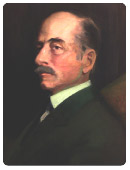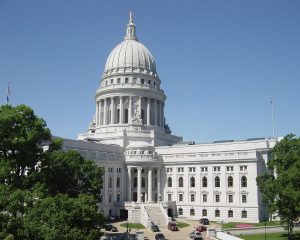
John B. Winslow
As announced this past summer, Joseph A. Ranney is serving as Marquette Law School’s Schoone Visiting Fellow in Wisconsin Law and using the occasion to write a book examining the role states have played in the evolution of American law, with a focus on the contributions made by Wisconsin. In a series of blog posts this semester, Professor Ranney will offer some Schoone Fellowship Field Notes. This is the first.
What makes a great judge? Who are the great state judges? Thousands of judges have helped build the edifice that is American state law. Only a few have received great acclaim. What are the elements of judicial greatness, and has Wisconsin produced any great judges? Let me consider the matter, excluding any current or recent judges.
Roscoe Pound’s “top ten” list of great American judges in The Formative Era of American Law (1938) is the most famous pass at the question, but Pound did little musing on the criteria of judicial greatness. Judge Richard Posner made a more ambitious effort to address the question in his Cardozo: A Study in Reputation (1990), focusing on both quantitative measures (number of decisions, books and articles written, and number of times cited by other jurists) and more-elusive qualitative measures (e.g., whether a judge has a long-range vision of the law and if so, her tenacity in pursuing that vision and her ability to persuade her colleagues to follow it).
Years of poring through American state case law and historical literature have led me to several conclusions. First, although it is not easy to articulate what makes a judge great, it is not difficult to spot the judges who qualify. They all wrote well, had strong views, were unusually good at bringing their colleagues around to those views (some in more dominating ways, some in gentler ways), and often took their case to the public outside the courtroom. Above all, they were persistent.
Second, some great judges have been duly recognized as such — for example, Benjamin Cardozo and James Kent (New York), Thomas Cooley (Michigan), and Roger Traynor (California). But others have languished in comparative obscurity, including John Dillon (Iowa), Joseph Lumpkin (Georgia), Richmond Pearson (North Carolina), George Robertson (Kentucky), Rousseau Burch (Kansas) — and John Winslow of Wisconsin. These judges deserve to be better known than they are. One of my goals in the Schoone project is to make that happen for Winslow.
Who were the greatest Wisconsin judges? The Yale Biographical Dictionary of American Law (2009), the most recent anthology, places three Wisconsin judges in the pantheon: Luther Dixon, Edward Ryan, and Shirley Abrahamson. Do they deserve that status? Ryan’s was a “lifetime achievement” greatness: he made his mark through a 40-year career as a constitution-maker, lawyer, and politician. Ryan accomplished important things: his decision in the Potter Law Case (1874), upholding the state’s right to regulate railroads and other large corporations, is arguably the most important decision the Wisconsin Supreme Court ever issued. But his time on the court was short (six years) and was a coda to his life work. Dixon’s most important work came in dissent; he left a real stamp on the law but not a giant one. Chief Justice Abrahamson’s career is not yet done, and it seems too early to evaluate her place in history.
The case for John Winslow. Winslow’s story will be more fully told in the book that will come out of the Schoone Fellowship, but here is the short case for his greatness. Life instilled in him an unusual sensitivity to outside points of view, reinforced by the fact that, as a Democrat in a predominantly Republican state at a time when judicial elections were still partisan, he repeatedly had to struggle for reelection even though he commanded universal respect. Winslow’s outsider sympathies manifested early: as a circuit judge in the 1880s, he interpreted an election law liberally in order to give Wisconsin women a meaningful right to vote in school elections, but he was overruled by the Supreme Court.
During the early years of the Progressive era, signs surfaced, most notably in State ex rel. Zillmer v. Kreutzberg (1902), that Winslow and his colleagues would use substantive due process with a free hand against reform laws. But as Progressive criticism of the courts grew, Winslow fashioned himself as an honest broker between the two. His opinion in Nunnemacher v. State (1906) was a model of creative draftsmanship, clothing a decision in favor of the state’s new inheritance tax in language highly deferential to conservative sensibilities. After Winslow became chief justice in late 1907, he lectured and wrote extensively, explaining to Progressives the importance of judicial conservatism to preservation of social stability and individual liberties, and explaining to conservatives the importance of a flexible, socially adaptive constitutionalism.
Winslow’s colleague Roujet Marshall, a devout constitutional originalist, was a worthy opponent but over time Winslow’s more flexible view proved better suited to the times, and it prevailed. In one of Winslow’s last major cases, State v. Lange Canning Co. (1916), he persuaded his colleagues to usher in an era of openness to government by administrative agency. Winslow’s contribution to Wisconsin’s Progressive legacy is less well known than Robert LaFollette’s, but I hope to show in the forthcoming book that it is equally important.


Doesn’t “persuaded his colleagues to usher in an era of openness to government by administrative agency” mean what you elsewhere noted Chief Justice Rosenberry wrote?
“[T]hose who have opposed the creation and extension of administrative tribunals have as a rule had the best of the argument on legal and constitutional grounds, but have been obliged to yield to an irresistible social pressure. …” Administrative Law and the Constitution, 23 Am. Pol. Sci. Rev. 32, 34-35 (1929).